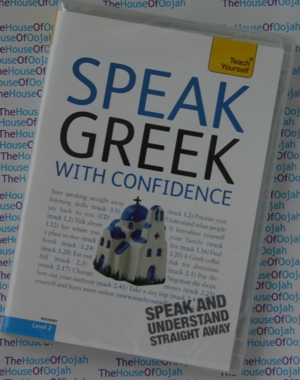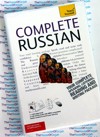Teach Yourself Greek Conversation - 3 Audio CDs and a Booklet

Speak Greek with Confidence3 Audio CDs and a BookletGet Other Greek Language Learning click here |
 |
Speak Greek with Confidence - 3 Audio CDs and a BookletBrand New (still shrink wrapped) 3 CDs and Booklet : As well as providing essential vocabulary and phrases, the course also aims to improve your understanding of spoken Greek, so that you can feel sure of yourself in two-way conversations. Based on the ten situations you are most likely to find yourself in while travelling abroad, the course builds your knowledge and understanding gradually, and is suitable for complete beginners. A booklet is included, with the dialogues and their English translations. A glossary of the words and phrases used also provides you with a handy phrasebook while you travel. By the end of this course, you will be at Level A2 of the Common European Framework for Languages: Can understand sentences and frequently used expressions. Can communicate in simple and routine tasks * Learn anywhere, any time with this convenient audio course which requires no reading or writing Table of Contents:
Hara Garoufalia-Middle teaches Greek to adults of all ages and levels at the evening programme of the University of Westminster, and at the City Literary Institute. Greek has a documented history of 3,400 years, the longest of any single natural language in the Indo-European language family. It is also one of the earliest attested Indo-European languages, with fragmentary records in Mycenaean dating back to the 15th or 14th century BC, making it the world's oldest recorded living language. Today, it is spoken by approximately 17–25 million people in Greece (official), Cyprus (official), Albania, Bulgaria, the Former Yugoslav Republic of Macedonia (FYROM), Italy, Turkey, Armenia, Georgia, Ukraine, Moldova, Romania, Russia, Egypt, Jordan and emigrant communities around the world, including Australia, United States, Canada, Germany and elsewhere. Greek has been written in the Greek alphabet (the oldest continuously used alphabet, and the first to introduce vowels) since the 9th century BC in Greece (before that in Linear B), and the 4th century BC in Cyprus (before that in Cypriot syllabary). Greek literature has a continuous history of nearly three thousand years. Greek is a language distinguished by an extraordinarily rich vocabulary. In respect to the roots of words, ancient Greek vocabulary was essentially of Indo-European origin, but with a significant number of borrowings from the idioms of the populations that inhabited Greece before the arrival of Proto-Greeks. Words of non-Indo-European origin can be traced into Greek from as early as Mycenaean times; they include a large number of Greek toponyms. The vast majority of Modern Greek vocabulary is directly inherited from ancient Greek, although in certain cases words have changed meanings. Words of foreign origin have entered the language mainly from Latin, Italian and Ottoman Turkish. During older periods of the Greek language, loan words into Greek acquired Greek inflections, leaving thus only a foreign root word. Modern borrowings (from the 20th century on), especially from French and English, are typically not inflected. Like most Indo-European languages, Greek is highly inflected. Greek grammar has come down through the ages fairly intact, though with some simplifications. For example, Modern Greek features two numbers: singular and plural. The dual number of Ancient times was abandoned at a very early stage. The instrumental case of Mycenaean Greek disappeared in the Archaic period, and the dative-locative of Ancient Greek disappeared in the late Hellenistic. Four cases, nominative, genitive, accusative and vocative, remain in Modern Greek. The three ancient gender noun categories (masculine, feminine and neuter) never fell out of use, while adjectives agree in gender, number, and case with their respective nouns, as do their articles. Greek verbs have synthetic inflectional forms for: * mood — Ancient Greek: indicative, subjunctive, imperative, and optative; Modern Greek: indicative and imperative (other modal functions are expressed by periphrastic constructions) |
Speak Greek with Confidence - 3 Audio CDs and a Booklet |

 0 Items (Empty)
0 Items (Empty)






